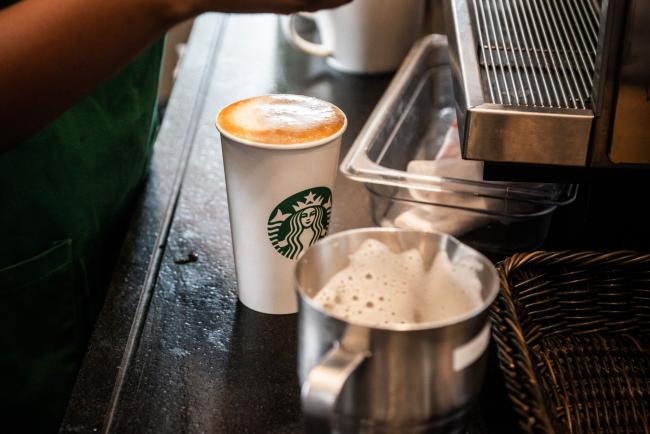(Bloomberg) -- In a work-from-home world, hitting the local cafe for a daily caffeine fix has become a ritual of the now-forgotten past. And no matter how much kitchen brewing consumers take up, that just can’t seem to make up for the demand blow.
Global coffee consumption is set to fall this year for the first time since 2011, the U.S. Department of Agriculture predicts. That’s even with a huge surge in bean buying at the grocery store amid pantry loading. Shutdowns for cafes and restaurants -- which typically account for about 25% of demand -- were overwhelming, and it could be a while before things pick up again.
The disappearance of cafe culture is happening in every major region. Researcher Marex Spectron estimates globally more than 95% of the out-of-home market was shuttered at some point during the pandemic. It’s the latest cruel twist of the coronavirus, which has ripped so much away from people that not even the simple pleasure of lingering over a latte is safe.
For Notes, a coffee-shop chain in London, restrictions are easing in the city, but most of its 10 cafes that cater to office workers remain closed.
“It will be a slow and staggered comeback for us as a lot of the offices in London are not coming back on until after summer, and some may even open only next year,” said co-founder Robert Robinson.
Consumers have shown they’re hesitant to dine out in droves again as economies reopen. Coffee shops, which often depend on morning commuters and afternoon breakers, have been especially hard hit. Dunkin’ Brands Group Inc. has lost much of its breakfast crowd during the coronavirus pandemic, while Starbucks Corp (NASDAQ:SBUX). is retooling its model, rolling out a “pickup” store format that doesn’t have any of the tables and chairs that traditionally made its cafes a popular hang-out spot.
“If you feel like having a cappuccino, ordering it online doesn’t really work as coffee is all about the social aspect,” said Robinson.
A hobbled recovery for coffee demand could be devastating for the roughly 125 million globally that depend on the crop for their livelihood. Growers were already struggling through financial crisis after years of bumper harvests sparked a prolonged bear market. Citigroup Inc (NYSE:C). predicts that futures for arabica beans could drop roughly 10% in the second half of the year to about 90 cents a pound, hovering near break-even costs. Meanwhile the International Coffee Organization has warned of the dangers of child labor in producing regions as poverty increases for farmers.
Brazil’s Suplicy Cafes Especiais, one of the country’s largest cafe chains, was forced to postpone payments to farmers for cargoes that had already been delivered. Meanwhile, orders for new supplies will resume only gradually, Chief Executive Officer Felipe Braga said in a telephone interview.
Suplicy operates 25 stores, the vast majority of which have been closed by Covid-19 restrictions since mid-March. A handful reopened recently amid easing lockdown restrictions, but then they were shuttered once again because not enough customers were coming through.
“Some of our franchising partners already warned us that they will close” permanently, Braga said.
Still, some shop operators are taking steps to change their business model, which could help spark some rebound.
Max Crowley’s two Bandit coffee shops in New York’s Midtown and Chelsea neighborhoods remain “on pause,” hobbled by the closure of local offices. Meanwhile, he’s just opened up a new Hamptons location in the Town of Southampton, an enclave where many New York City dwellers fled to at the peak of the pandemic and where well-to-do residents spend summers.
“Manhattan traffic is still very light. The Hamptons is very busy. It makes sense for us. It’s where many of our customers go,” Crowley said.
There’s also some optimism the worst is over.
In Asia, the fastest-growing market for coffee, consumption at restaurants and cafes is expected to recover in the second half of the year as many countries emerge from lockdowns, according to Tan Heng Hong, APAC food and drink analyst at market research company Mintel. And the USDA also predicts a rebound in global demand next year.
Still, a global second wave of infections could halt reopening plans. McDonald’s Corp. has said its pausing the resumption of all dine-in services in its U.S. restaurants as the virus flares up in areas across the country. And even if stores open, fears of contagion could continue to keep customers away. Starbucks is operating about 95% of the company’s U.S. stores, but comparable sales were down 43% in May.
Plus there’s the economic downturn, which generally spurs consumers to trim their dining out expenses.
The Dalgona coffee sensation -- a fluffy, whipped beverage made from instant coffee that was popularized on social media -- shows that consumers are trying to recreate the fun cafe experience at home instead. That could end up helping to rescue prices of robusta beans, used in instant varieties, to the detriment of pricier arabicas.
Robusta futures are down 13% this year in London, while arabica beans slumped 25% in New York.
“We believe that consumers will move down price points, and turn more to cheaper, instant coffee, as they tighten their belts amidst the gloomy economic outlook,” Taohai Lin, a consumer and retail analyst at Fitch Solutions. “Consumers will continue to embrace home brew and instant coffee, both because they will still avoid heading out to cafes, and also because it is generally a cheaper alternative.”
(Updates coffee futures performance in penultimate paragraph)
©2020 Bloomberg L.P.
